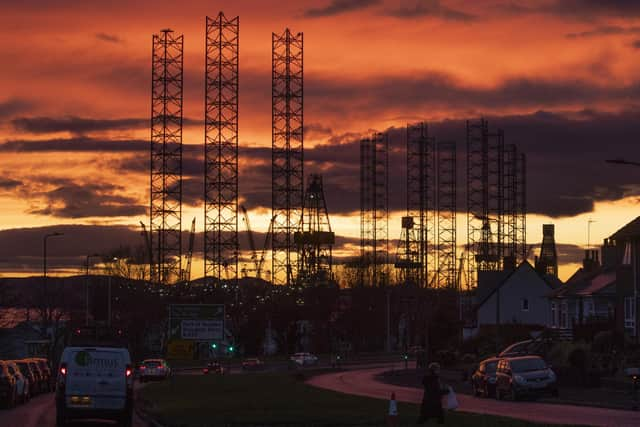New North Sea oil and gas fields should be opened in wake of Putin's efforts to drive up prices, claim producers
Last year a report by the International Energy Agency called for an immediate end to the global development of new oil and gas fields if the ambition of reaching net zero emissions by 2050 was to be achieved.
But a new report published today by trade body Offshore Energies UK, which was formerly known as Oil and Gas UK, has called on the Government to issue the next round of oil and gas exploration licences for the North Sea as soon as possible.
Advertisement
Hide AdAdvertisement
Hide AdIt said that in addition to a rapid expansion of offshore wind turbines, the move is necessary to maximise the UK’s energy independence and reduce its vulnerability to global price shocks.


According to its report, there are energy reserves of 15 billion barrels of oil potentially available – enough to fuel the UK for 30 years.
Approximately half of the UK’s gas and around 80% of its refined oils is imports, meaning the majority of the additional funds spent on bills will be given to other countries, the report said.
When challenged in a media briefing as to how the ambitions tally with the IEA’s 2021 report, Ross Dornan, OEUK’s market intelligence manager, said that the Russian invasion of Ukraine earlier this year and its subsequent impact on global gas prices has put things into a different perspective.
Advertisement
Hide AdAdvertisement
Hide AdHe said: “The IEA net zero scenario is a scenario – it is one of many which outline a potential path through to net zero.
"But I think what we have seen in the last six months or so is the consequences of that advice if it was to be followed.
"What that would do is shift a bigger proportion of the world’s energy production onto a smaller number of countries – namely OPEC countries and countries like Russia. What we have found with Russia is they are not reliable partners.
"If we enter into a position with no new oil and gas fields in the UK, in Norway, America, Australia and other places around the world we would be in a quite awful situation compared to what we are even in.
Advertisement
Hide AdAdvertisement
Hide Ad"We didn’t think it was good advice at the time – I think what has happened in the last six months has reinforced that even further. That is not a realistic scenario when it comes to achieving net zero balanced against continued provision of secure energy.”
OEUK Energy Policy manager Will Webster added: “The report was written a year ago and it hasn’t really stood up very well to events.
"It is essentially a big spreadsheet model of the global economy that treats every gas and oil resource as equally reliable and equally responsible. We’ve found out that is not the case.
"Even within the report when it was written it implied increased global dependence on OPEC countries from 37% to 52%.
Advertisement
Hide AdAdvertisement
Hide Ad"It did reflect the fact that individual countries where they have a process to reduce emissions, like we have in the UK, would have a good case for saying their national resources should be prioritised. That has played out over the last six to 12 months.”
OEUK’s Acting CEO Mike Tholen said: “Our report is a red alert for UK energy security. Today 24 million UK homes are heated by gas boilers; 30-plus gas-fired power stations produce about 40% of our electricity, and we have 32 million vehicles running on diesel and petrol.
“The UK’s homes and businesses cannot yet do without these fuels, but Putin’s war in Ukraine shows the risks of relying on other countries for energy. Our North Sea reserves mean the UK can protect itself – provided we invest – as well as building the low-carbon systems for the future.”
“It means we must expand the supply of low carbon energy including wind and hydrogen but the scale-up will take time. UK gas will give us a bedrock of reliable energy through the transition and minimise reliance on imports.
“In practical terms we need the new government to rapidly announce the next round of oil and gas exploration licenses and speed up production approvals.”